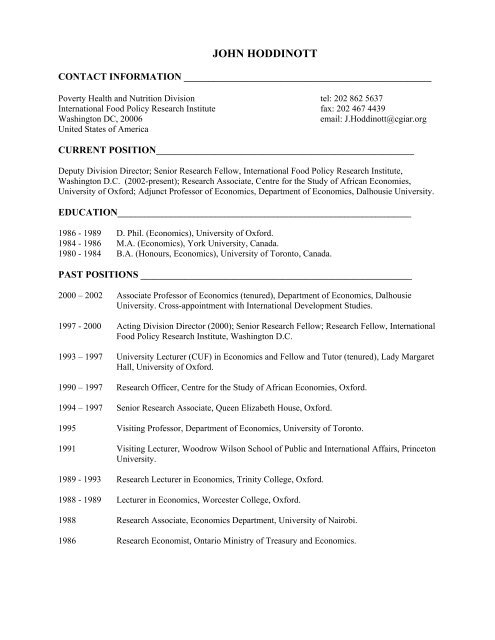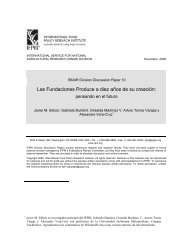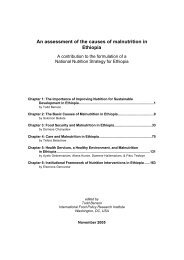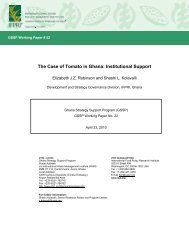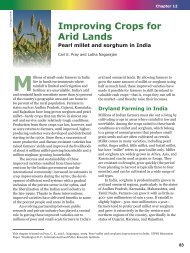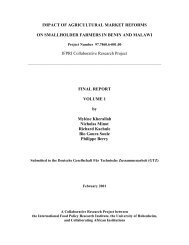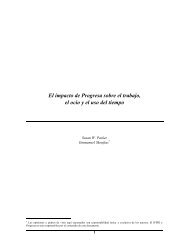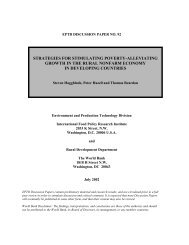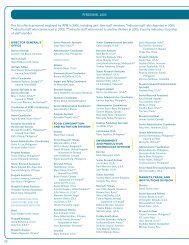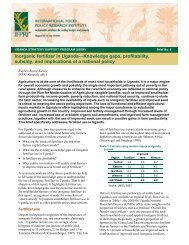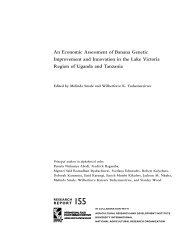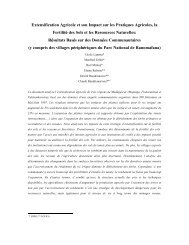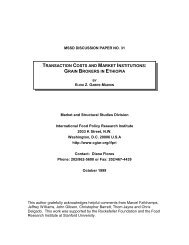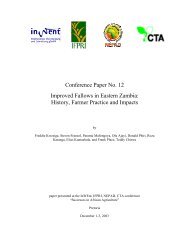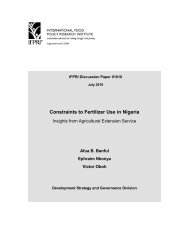JOHN HODDINOTT - International Food Policy Research Institute
JOHN HODDINOTT - International Food Policy Research Institute
JOHN HODDINOTT - International Food Policy Research Institute
You also want an ePaper? Increase the reach of your titles
YUMPU automatically turns print PDFs into web optimized ePapers that Google loves.
<strong>JOHN</strong> <strong>HODDINOTT</strong><br />
CONTACT INFORMATION ___________________________________________________<br />
Poverty Health and Nutrition Division tel: 202 862 5637<br />
<strong>International</strong> <strong>Food</strong> <strong>Policy</strong> <strong>Research</strong> <strong>Institute</strong> fax: 202 467 4439<br />
Washington DC, 20006<br />
email: J.Hoddinott@cgiar.org<br />
United States of America<br />
CURRENT POSITION__________________________________________________________<br />
Deputy Division Director; Senior <strong>Research</strong> Fellow, <strong>International</strong> <strong>Food</strong> <strong>Policy</strong> <strong>Research</strong> <strong>Institute</strong>,<br />
Washington D.C. (2002-present); <strong>Research</strong> Associate, Centre for the Study of African Economies,<br />
University of Oxford; Adjunct Professor of Economics, Department of Economics, Dalhousie University.<br />
EDUCATION__________________________________________________________________<br />
1986 - 1989 D. Phil. (Economics), University of Oxford.<br />
1984 - 1986 M.A. (Economics), York University, Canada.<br />
1980 - 1984 B.A. (Honours, Economics), University of Toronto, Canada.<br />
PAST POSITIONS _____________________________________________________________<br />
2000 – 2002 Associate Professor of Economics (tenured), Department of Economics, Dalhousie<br />
University. Cross-appointment with <strong>International</strong> Development Studies.<br />
1997 - 2000 Acting Division Director (2000); Senior <strong>Research</strong> Fellow; <strong>Research</strong> Fellow, <strong>International</strong><br />
<strong>Food</strong> <strong>Policy</strong> <strong>Research</strong> <strong>Institute</strong>, Washington D.C.<br />
1993 – 1997 University Lecturer (CUF) in Economics and Fellow and Tutor (tenured), Lady Margaret<br />
Hall, University of Oxford.<br />
1990 – 1997 <strong>Research</strong> Officer, Centre for the Study of African Economies, Oxford.<br />
1994 – 1997 Senior <strong>Research</strong> Associate, Queen Elizabeth House, Oxford.<br />
1995 Visiting Professor, Department of Economics, University of Toronto.<br />
1991 Visiting Lecturer, Woodrow Wilson School of Public and <strong>International</strong> Affairs, Princeton<br />
University.<br />
1989 - 1993 <strong>Research</strong> Lecturer in Economics, Trinity College, Oxford.<br />
1988 - 1989 Lecturer in Economics, Worcester College, Oxford.<br />
1988 <strong>Research</strong> Associate, Economics Department, University of Nairobi.<br />
1986 <strong>Research</strong> Economist, Ontario Ministry of Treasury and Economics.
PROFESSIONAL SERVICE ____________________________________________________<br />
Managing Editor, Journal of African Economies: 2009-2011<br />
Technical Advisor, Strengthening Emergency Needs Assessment Capacities (SENAC), World <strong>Food</strong><br />
Programme: 2005-2008<br />
Member, Publications Review Committee, <strong>International</strong> <strong>Food</strong> <strong>Policy</strong> <strong>Research</strong> <strong>Institute</strong>: 2000, 2005-2008<br />
Member, Editorial Board, The Journal of Development Studies: 2003-present<br />
Member, Editorial Board, Oxford Development Studies: 1997-2007<br />
Leland Program <strong>Policy</strong> Advisor, Congressional Hunger Center: 2009-2011<br />
RESEARCH INTERESTS ______________________________________________________<br />
My principal research interest lies in the microeconometric analysis of issues in development economics. I<br />
am particularly interested in the causes of poverty and food insecurity, the processes of poverty dynamics<br />
and the design and evaluation of interventions that would reduce it. Much of my recent work has focused on<br />
the determinants of human capital formation – particularly nutrition - both for their intrinsic value and<br />
because they are instrumental in reducing poverty. Understanding these determinants requires the modeling<br />
of the processes by which households allocate scarce resources amongst members. It requires understanding<br />
the operation of factor markets, especially labor markets. And, at an international level, trying to improve<br />
matters requires, in part, more appropriate and more appropriately targeted aid flows and through reforms to<br />
the global food security architecture such as the <strong>Food</strong> Aid Convention. While undertaking this work, I have<br />
organized a number of household surveys. This has entailed living in both a mud hut in western Kenya and a<br />
small town near Timbucktu, as well as developing longitudinal and cross-sectional household and<br />
community surveys in Cote d’Ivoire, Ethiopia, Guatemala, Kenya, Mali, Namibia and Zimbabwe and all this<br />
has also led to an interest in methodological issues. I have given more than 100 formal presentations of this<br />
work, as well as informal presentations in developed and developing countries to audiences including cabinet<br />
ministers, senior officials in various governments and donor agencies and village leaders in rural Mali. The<br />
nutrition work was written up in a May 2004 issue of the Economist magazine. A loose grouping of my<br />
publications is:<br />
1/ Poverty, food security and poverty dynamics:<br />
B3, J45, J33, J32, J21, J18, J17, J3, C23, C21, C18, U4, U3,<br />
M32, M31, M24, M7, M1<br />
2/ Intervention design and evaluation: B8, B7, B6, B5, J48, J38, J37, J31, J30, J26, J25, J23, J22, C28,<br />
C26, C25, C16, C15, C14, U7, U1, M33, M29, M26, M25, M23,<br />
M8<br />
3/ Human capital, including nutrition: J47, J46, J44, J43, J39, J36, J35, J28, J27, J20, J12, J11, J4, C29,<br />
C27, C22, C20, C19, C17, U10, U9, U8, U6, U5, U2, M30, M20,<br />
M13, M3, M2<br />
4/ Intrahousehold resource allocation: B2, J42, J34, J15, J10, J9, J8, J7, J6, J5, J2, J1, C10, C9, C8, C6,<br />
C5, M23, M6, M4<br />
5/ Labor markets: J29, J14, J13, C11, C7<br />
6/ Methods: J40, B4, B1, J40, J19, J16, C30, C13, C12, C4, C3, C2, C1,<br />
M34, M27, M19, M18, M15, M11, M9<br />
7/ Aid flows: J41, J24, M28, M21, M17, M16, M14, M12, M10, M5<br />
2
PUBLICATIONS_______________________________________________________________<br />
Books and monographs<br />
[B8] M. Adato and J. Hoddinott (eds), Conditional Cash Transfers in Latin America (Baltimore: Johns<br />
Hopkins University Press), forthcoming.<br />
[B7] A. Ahmed, A. Quisumbing, M. Nasreen, J. Hoddinott, and E. Bryan. Comparing <strong>Food</strong> and Cash<br />
Transfers to the Ultra-Poor in Bangladesh, IFPRI <strong>Research</strong> Report, forthcoming.<br />
[B6] M. Adato, L.Haddad and J. Hoddinott, 2005, Power, Politics and Performance: Community<br />
Participation in South African Public Works Programs, IFPRI <strong>Research</strong> Report 143, (Washington:<br />
<strong>International</strong> <strong>Food</strong> <strong>Policy</strong> <strong>Research</strong> <strong>Institute</strong>).<br />
[B5] D. Coady, M. Grosh and J. Hoddinott, 2004. The Targeting of Transfers in Developing Countries:<br />
Review of Experience and Lessons, (Washington: World Bank and IFPRI). Simultaneously published in<br />
Spanish and Russian. Arabic and Indonesian translations, 2005.<br />
[B4] J. Hoddinott (ed.), 2001. <strong>Food</strong> Security in Practice: Methods for Rural Development Projects,<br />
(Washington: <strong>International</strong> <strong>Food</strong> <strong>Policy</strong> <strong>Research</strong> <strong>Institute</strong>). Spanish translation, 2003.<br />
[B3] B. Baulch and J. Hoddinott (eds.), 2000. Economic Mobility and Poverty Dynamics in Developing<br />
Countries, (London: Frank Cass).<br />
[B2] L. Haddad, J. Hoddinott and H. Alderman (eds.), 1997. Intrahousehold Resource Allocation in<br />
Developing Countries: Models, Methods and <strong>Policy</strong>, (Baltimore: Johns Hopkins University Press).<br />
[B1] S. Devereux and J. Hoddinott (eds), 1992. Fieldwork in Developing Countries, (Harvester Wheatsheaf,<br />
UK and Lynne Reinner, USA).<br />
Journal articles<br />
[J48] D. Gilligan, J. Hoddinott, and A. Seyoum, 2009. “An analysis of Ethiopia’s Productive Safety Net<br />
Programme and its linkages”, Journal of Development Studies 45(10): 1684-1706.<br />
[J47] K. Yount, J. Hoddinott, A. Stein and A. DiGirolamo, 2009. “Individual capital and cognitive aging in<br />
Guatemala,” Population Studies 63(3): 295-306.<br />
[J46] J. Behrman, M. C. Calderon, S. Preston, J. Hoddinott, R. Martorell and A. Stein, 2009. “Nutritional<br />
supplementation of girls influences the growth of their children: Prospective study in Guatemala,” American<br />
Journal of Clinical Nutrition 90(5): 1372-1379. DOI: http://dx.doi.org/10.3945/ajcn.2009.27524<br />
[J45] S. Dercon, D. Gilligan, J. Hoddinott and T. Woldehanna. 2009. “The impact of roads and agricultural<br />
extension on consumption growth and poverty in fifteen Ethiopian villages,” American Journal of<br />
Agricultural Economics 91(4): 1007-1021. DOI: http://dx.doi.org/10.1111/j.1467-8276.2009.01325.x<br />
[J44] J. Maluccio, J. Hoddinott, J. Behrman, R. Martorell, A. Quisumbing, and A. Stein, 2009. “The impact<br />
of nutrition during early childhood on education among Guatemalan Adults”, Economic Journal 119(April):<br />
734-763. DOI: http://dx.doi.org/10.1111/j.1468-0297.2009.02220.x<br />
3
[J43] A. Stein, M. Wang, A. DiGirolamo, J. Hoddinott, R. Martorell, M. Ramirez-Zea, and K. Yount, 2009.<br />
“Height for Age Increased While Body Mass Index for Age Remained Stable between 1968 and<br />
2007 among Guatemalan Children”, Journal of Nutrition 139(2): 365-369. DOI:<br />
http://dx.doi.org/10.3945/jn.108.098343<br />
[J42] M. Islam and J. Hoddinott, 2009, “Evidence of intra-household flypaper effects from a nutrition<br />
intervention in rural Guatemala,” Economic Development and Cultural Change 57(2): 215-248. [Lead<br />
article] DOI: http://dx.doi.org/10.1086/592876<br />
[J41] J. Hoddinott, M. Cohen and C. Barrett, 2008, “Renegotiating the <strong>Food</strong> Aid Convention: Background,<br />
Context, and Issues,” Global Governance 14(3): 283-304. Text/More Information Online (HTML)<br />
[J40] A. Stein, P. Melgar, J. Hoddinott, and R. Martorell, 2008, “Cohort Profile: The INCAP Nutritional<br />
Trial Cohort Study,” <strong>International</strong> Journal of Epidemiology 37(4): 716-720. DOI:<br />
http://dx.doi.org/10.1093/ije/dyn028<br />
[J39] J. Hoddinott, J. Maluccio, J. Behrman, R. Flores and R. Martorell, 2008, “Effect of a nutrition<br />
intervention during early childhood on economic productivity in Guatemalan adults”, The Lancet 371: 411-<br />
416. This paper was nominated for the CGIAR Science Award for an Outstanding Scientific Article 2009.<br />
DOI: http://dx.doi.org/10.1016/S0140-6736(08)60205-6<br />
[J38] J. Hoddinott, 2007, “Social protection: To target or not to target”, IDS Bulletin 38: 90-94.<br />
http://www.ids.ac.uk/index.cfm?objectId=7491287B-E346-B0AC-0F40A6145C744CE2<br />
[J37] D. Gilligan and J. Hoddinott, 2007, “Is there persistence in the impact of emergency food aid?<br />
Evidence on consumption, food security and assets in rural Ethiopia”, American Journal of Agricultural<br />
Economics 89(2): 225-242. [Lead article. Received American Agricultural Economics Association<br />
Outstanding Journal Article Award] http://dx.doi.org/10.1111/j.1467-8276.2007.00992.x<br />
[J36] H. Alderman, J. Behrman and J. Hoddinott, 2007, “Economic and nutritional analyses offer substantial<br />
synergies for understanding human nutrition”, Journal of Nutrition 137: 537-544.<br />
http://jn.nutrition.org/cgi/content/abstract/137/3/537<br />
http://jn.nutrition.org/cgi/reprint/137/3/537.pdf<br />
[J35] H. Alderman, J. Hoddinott and B. Kinsey, 2006, “Long term consequences of early childhood<br />
malnutrition”, Oxford Economic Papers 58(3): 450-474. This paper was nominated for the CGIAR Science<br />
Award for an Outstanding Scientific Article 2007. DOI: http://dx.doi.org/10.1093/oep/gpl008<br />
[J34] J. Hoddinott, 2006. “Shocks and their consequences across and within households in rural Zimbabwe”,<br />
Journal of Development Studies 42(2): 301-321. DOI: http://dx.doi.org/10.1080/00220380500405501<br />
[J33] S. Dercon, J. Hoddinott and T. Woldehanna, 2005. “Shocks and consumption in 15 Ethiopian Villages,<br />
1999-2004”, Journal of African Economies 14(4): 559-585. DOI: http://dx.doi.org/10.1093/jae/eji022<br />
[J32] S. Harrower and J. Hoddinott, 2005. “Consumption smoothing in the Zone Lacustre, Mali,” Journal of<br />
African Economies 14(4): 489-519. DOI: http://dx.doi.org/10.1093/jae/eji007<br />
[J31] A. Abdulai, C. Barrett and J. Hoddinott, 2005. “Does food aid really have disincentive effects? New<br />
evidence from sub-Saharan Africa”, World Development 33(10): 1689-1704.<br />
4
[J30] J. Behrman and J. Hoddinott, 2005. “Program evaluation with unobserved heterogeneity and selective<br />
implementation: The Mexican Progresa impact on child nutrition”, Oxford Bulletin of Economics and<br />
Statistics, vol 67, pp. 547-569. DOI: http://dx.doi.org/10.1111/j.1468-0084.2005.00131.x<br />
[J29] J. Hoddinott, J. Behrman and R. Martorell, 2005. “Labor force participation and income among young<br />
Guatemalan adults”, <strong>Food</strong> and Nutrition Bulletin, vol 26 (2, Supplement 1), pp. S98−S109.<br />
[J28] A.D. Stein, C. Gregory, J. Hoddinott, R. Martorell, U. Ramakrishnan, and M. Ramirez-Zea, 2005.<br />
“Physical activity level, dietary habits, and alcohol and tobacco use among a cohort of young Guatemalan<br />
adults”, <strong>Food</strong> and Nutrition Bulletin, vol 26 (2, Supplement 1), pp. S78-S87.<br />
[J27] M. Ramirez-Zea, P. Melgar, R. Flores, J. Hoddinott, U. Ramakrishnan and A.D. Stein, 2005. “Physical<br />
fitness, body composition, blood pressure, and blood metabolic profile among a cohort of Guatemalan<br />
adults”, <strong>Food</strong> and Nutrition Bulletin, vol 26 (2, Supplement 1), pp. S88-S97.<br />
[J26] J. Hoddinott and E. Skoufias, 2004. “The impact of PROGRESA on food consumption”, Economic<br />
Development and Cultural Change, vol. 53, pp. 37-61. DOI: http://dx.doi.org/10.1086/423252<br />
[J25] D. Coady, M. Grosh and J. Hoddinott, 2004. “Targeting outcomes redux”, World Bank <strong>Research</strong><br />
Observer, vol. 19, pp. 61-85.<br />
[J24] R. Macdonald and J. Hoddinott, 2004. “Determinants of Canadian bilateral aid: Humanitarian,<br />
commercial or political?” Canadian Journal of Economics, vol. 37, pp. 294-312.<br />
[J23] T. Owens, J. Hoddinott and B. Kinsey, 2003. “Ex ante actions and ex post public responses to drought<br />
shocks: Evidence and simulations from Zimbabwe” World Development, vol. 31, pp. 1239-1256. DOI:<br />
http://dx.doi.org/10.1016/S0305-750X(03)00068-8<br />
[J22] T. Owens, J. Hoddinott and B. Kinsey, 2003. “The impact of agricultural extension on farm production<br />
in resettlement areas of Zimbabwe”, Economic Development and Cultural Change, vol. 51, pp 337-358.<br />
DOI: http://dx.doi.org/10.1086/346113<br />
[J21] J. Hoddinott, 2002. “Participation and poverty reduction: An analytical framework and overview of the<br />
issues”, Journal of African Economies, vol. 11, pp. 144-166. DOI: http://dx.doi.org/10.1093/jae/11.1.146<br />
[J20] J. Hoddinott and B. Kinsey, 2001. “Child growth in the time of drought”, Oxford Bulletin of Economics<br />
and Statistics, vol. 63, pp. 409-436. [Lead article] DOI: http://dx.doi.org/10.1111/1468-0084.t01-1-00227<br />
[J19] L. Christiaensen, J. Hoddinott and G. Bergeron, 2001. “Comparing village characteristics derived from<br />
rapid appraisals and household surveys: A tale from northern Mali”, Journal of Development Studies, vol.<br />
37, pp. 1-20. [Lead article]<br />
[J18] B. Baulch and J. Hoddinott, 2000. “Economic mobility and poverty dynamics in developing countries”,<br />
Journal of Development Studies, vol. 36, pp. 1-24. [Lead article] DOI:<br />
http://dx.doi.org/10.1080/00220380008422652<br />
[J17] J.W. Gunning, J. Hoddinott, B. Kinsey and T. Owens, 2000. “Revisiting forever gained: Income<br />
dynamics in the resettlement areas of Zimbabwe, 1983-1997”, Journal of Development Studies, vol. 36, pp.<br />
131-154. DOI: http://dx.doi.org/10.1080/00220380008422657<br />
5
[J16] S. Morris, C. Carletto, J. Hoddinott and L. Christiaensen, 2000. “Validity of rapid estimates of<br />
household wealth and income for health surveys in rural Africa”, Journal of Epidemiology and Community<br />
Health, vol. 54, pp. 381-387. DOI: http://dx.doi.org/10.1136/jech.54.5.381<br />
[J15] P. Maggs and J. Hoddinott, 1999. “The impact of changes in common property resource management<br />
on intrahousehold allocation” Journal of Public Economics, vol. 72, pp. 317-324. Reprinted in Property<br />
rights and environmental problems, ed. by B. Larson, Ashgate, 2003.<br />
[J14] S. Appleton, J. Hoddinott and P. Krishnan, 1999. “The gender wage gap in three African countries”,<br />
Economic Development and Cultural Change, vol. 42, pp. 289-312.<br />
[J13] J. Hoddinott, 1996. “Wages and unemployment in an urban African labour market”, Economic<br />
Journal, vol. 106, pp. 1610-1626.<br />
[J12] S. Appleton, J. Hoddinott and J. Mackinnon, 1996. “Education and health in sub-Saharan Africa”,<br />
Journal of <strong>International</strong> Development, vol.8, pp. 307-340. [Lead article] DOI:<br />
http://dx.doi.org/10.1002/(SICI)1099-1328(199605)8:33.0.CO;2-D<br />
[J11] S. Appleton, J. Hoddinott and J. Knight, 1996. “Primary education as an input into post-primary<br />
education: A neglected benefit”, Oxford Bulletin of Economics and Statistics, vol. 58, pp. 211-219.<br />
[J10] J. Hoddinott, 1996. “The intrahousehold distribution of food: An economic perspective” Social<br />
Change, vol. 26, pp. 45-56. Reprinted in Demographic transition in south Asia: Contours, contexts,<br />
constraints and consequences, ed by R. Balakrishnan, 2006.<br />
[J9] C. Udry, J. Hoddinott, L. Haddad and H. Alderman, 1995. “Gender differentials in farm productivity:<br />
Implications for household efficiency and agricultural policy”, <strong>Food</strong> <strong>Policy</strong>, vol. 20, pp. 407-423. DOI:<br />
http://dx.doi.org/10.1016/0306-9192(95)00035-D<br />
[J8] J. Hoddinott and L. Haddad, 1995. “Does female income share influence household expenditures?<br />
Evidence from Côte d'Ivoire”, Oxford Bulletin of Economics and Statistics, vol. 57, pp. 77-96.<br />
[J7] H. Alderman, P.A. Chiappori. L. Haddad, J. Hoddinott and S.M.R. Kanbur, 1995. “Unitary versus<br />
collective household models: Time to shift the burden of proof?” World Bank <strong>Research</strong> Observer, vol. 10,<br />
pp. 1-19. [Lead article]<br />
[J6] H. Alderman, L. Haddad, J. Hoddinott and S. Vosti, 1994. “Strengthening agricultural and natural<br />
resource policy through intrahousehold analysis: An introduction”, American Journal of Agricultural<br />
Economics, vol. 76, pp. 1208-1212.<br />
[J5] J. Hoddinott, 1994. “A model of migration and remittances applied to western Kenya” Oxford Economic<br />
Papers, vol. 46, pp. 459-476.<br />
[J4] L. Haddad and J. Hoddinott, 1994. “Women's income and boy-girl anthropometric status in the Côte<br />
d'Ivoire”, World Development, vol. 22, pp. 543-553.<br />
[J3] E. Francis and J. Hoddinott, 1993. “Migration and differentiation in western Kenya: A tale of two sub–<br />
locations”, Journal of Development Studies, vol. 30, pp. 115-145.<br />
6
[J2] J. Hoddinott, 1992. “Modelling remittance flows in Kenya”, Journal of African Economies, vol. 1, pp.<br />
206-232.<br />
[J1] J. Hoddinott, 1992. “Rotten kids or manipulative parents: Are children old age security in western<br />
Kenya?” Economic Development and Cultural Change, vol. 40, pp. 545-566. Reprinted in The economics of<br />
the family, ed. by N. Folbre, Edward Elgar, 1996.<br />
Chapters in books<br />
[C30] J. Hoddinott and A. Quisumbing, forthcoming. “Methods for microeconometric risk and vulnerability<br />
assessment” in Risk, Vulnerability and Human Development: On the brink ed by R. Fuentes-Nieva and P.<br />
Seck (London: Palgrave Macmillan- United Nations Development Programme).<br />
[C29] J. Hoddinott, D. Gilligan and A.S. Taffessee, forthcoming. “The impact of Ethiopia’s Productive<br />
Safety Net Program on Schooling and Child Labor” in Social Protection for Africa’s Children ed by S.<br />
Handa, S. Devereux, and D. Webb (London: Routledge).<br />
[C28] M. Adato and J. Hoddinott, forthcoming. “Conditional Cash Transfer Programs: A “Magic Bullet”?”<br />
in Conditional Cash Transfers in Latin America: A Magic Bullet to Reduce Poverty? ed. by M. Adato and J.<br />
Hoddinott (Baltimore: Johns Hopkins University Press).<br />
[C27] J. Hoddinott, forthcoming. “Nutrition and Conditional Cash Transfer (CCT) Programs” in Conditional<br />
Cash Transfers in Latin America: A Magic Bullet to Reduce Poverty? ed. by M. Adato and J. Hoddinott<br />
(Baltimore: Johns Hopkins University Press).<br />
[C26] J. Hoddinott and D. Wiesmann , forthcoming. “The Impact of Conditional Cash Transfer Programs on<br />
<strong>Food</strong> Consumption in Honduras, Mexico, and Nicaragua” in Conditional Cash Transfers in Latin America:<br />
A Magic Bullet to Reduce Poverty? Ed. By M. Adato and J. Hoddinott (Baltimore: Johns Hopkins University<br />
Press).<br />
[C25] M. Adato and J. Hoddinott, forthcoming. “Conditional Cash Transfers in the Second Decade: Current<br />
Debates and New Frontiers” in Conditional Cash Transfers in Latin America: A Magic Bullet to Reduce<br />
Poverty? Ed. By M. Adato and J. Hoddinott (Baltimore: Johns Hopkins University Press).<br />
[C24] J. Hoddinott and L. Bassett, 2009. “Los programas de transferencias monetarias condicionadas y la<br />
nutricion en America Latina: Evaluacion de impactos y estrategias para mejorarlos,” in Transferencias<br />
condicionadas, estrategias de combatae al hambre y la desnutricion en America Latina y el Caribe vol. II<br />
(Santaigo: <strong>Food</strong> and Agriculture Organization).<br />
[C23] J. Hoddinott, S. Dercon, and P. Krishnan, 2009. “Networks and informal mutual support in 15<br />
Ethiopian villages,” in Institutional Economics Perspectives on African Agricultural Development, ed. by J.<br />
Kirsten, A. Dorward, C. Poulton, and N. Vink (Baltimore: Johns Hopkins University Press).<br />
[C22] H. Alderman, J.R. Behrman and J. Hoddinott, 2008. “Health and nutrition and economic<br />
development,” in <strong>International</strong> Handbook of Development Economics, ed. by A. Dutt and J. Ros, eds.,<br />
(Northhampton, MA: Edward Elgar).<br />
[C21] M. Bourdillon, P. Hebinck, J. Hoddinott with B. Kinsey, J. Marondo, N. Mudege and T. Owens,<br />
2007. “Assessing the impact of HYV maize in resettlement areas of Zimbabwe”, in Agricultural research<br />
and poverty: Economic and social impacts in six countries, ed. by M. Adato and R. Meinzen-Dick<br />
(Baltimore: Johns Hopkins University Press).<br />
7
[C20] J. Behrman, H. Alderman and J. Hoddinott, 2007. “Hunger and malnutrition”, in How to spend $50<br />
billion to make the world a better place, ed by Bjorn Lomborg (Cambridge: Cambridge University Press). A<br />
slightly revised version appeared in Solutions for the World's Biggest Problems: Costs and Benefits ed by<br />
Bjorn Lomborg (Cambridge: Cambridge University Press).<br />
[C19] H. Alderman, J. Behrman and J. Hoddinott, 2005. “Nutrition, malnutrition and economic growth”, in<br />
Health and economic growth: Findings and policy implications ed. by G. López-Casasnovas, B. Rivera and<br />
L. Currais (Cambridge MA: MIT Press).<br />
[C18] S. Dercon and J. Hoddinott, 2005. “Health, shocks and poverty persistence” in Insurance against<br />
poverty ed. by S. Dercon (Oxford: Oxford University Press).<br />
[C17] J. Behrman, H. Alderman and J. Hoddinott, 2004. “Hunger and malnutrition”, in Global crisis, global<br />
solutions ed. by B. Lomborg (Cambridge, Cambridge University Press).<br />
[C16] J. Behrman and J. Hoddinott, 2003. “Social safety nets for more adaptable labor markets in developing<br />
countries”, in Improving Labor Market Opportunities and Security for Workers in Developing Countries ed<br />
by W. Kosanovich, Bureau of <strong>International</strong> Labor Affairs <strong>Research</strong> Symposium, Vol. 1 (Washington DC:<br />
United States, Department of Labor).<br />
[C15] J. Hoddinott, 2002. “СОЦіаЛьна ПОЛіТИКА: розробка та втілення” (“Social policy with a<br />
particular emphasis on youth: Issues in design and implementation”) in EKOHOMIчHИЙ POЗВИТОК I<br />
ДЕРЖАВНА ПОЛІТИКА, 8, <strong>Institute</strong> of Public Adminstration, Kyiv Ukraine.<br />
[C14] J. Hoddinott, 2001. “Targeting: Principles and practice” in <strong>Food</strong> security in practice: Methods for<br />
rural development projects, (Washington DC: <strong>International</strong> <strong>Food</strong> <strong>Policy</strong> <strong>Research</strong> <strong>Institute</strong>).<br />
[C13] J. Hoddinott, 2001. “Choosing outcome indicators of household food security” in <strong>Food</strong> security in<br />
practice: Methods for rural development projects, (Washington DC: <strong>International</strong> <strong>Food</strong> <strong>Policy</strong> <strong>Research</strong><br />
<strong>Institute</strong>).<br />
[C12] J. Hoddinott, 2001. “Introduction” in <strong>Food</strong> security in practice: Methods for rural development<br />
projects, (Washington DC: <strong>International</strong> <strong>Food</strong> <strong>Policy</strong> <strong>Research</strong> <strong>Institute</strong>).<br />
[C11] S. Appleton, J. Hoddinott, P. Krishnan and K. Max, 1998. “Does the labour market explain lower<br />
female schooling? Evidence from three African countries”, in Labour markets, poverty and Development ed<br />
by G. Navaretti, R. Faini and G. Zanalda, (Oxford: Oxford University Press).<br />
[C10] L. Haddad, J. Hoddinott and H. Alderman, 1997. “Introduction: The scope of intrahousehold<br />
allocation issues” in Intrahousehold Resource Allocation in Developing Countries: Models, Methods, and<br />
<strong>Policy</strong>, (Baltimore: Johns Hopkins University Press).<br />
[C9] J. Hoddinott, H. Alderman, and L. Haddad, 1997. “Testing competing models of intrahousehold<br />
allocation”, in Intrahousehold Resource Allocation in 7Developing Countries: Models, Methods and <strong>Policy</strong>,<br />
(Baltimore: Johns Hopkins University Press).<br />
[C8] H. Alderman, L. Haddad, and J. Hoddinott, 1997. “<strong>Policy</strong> issues and intrahousehold allocation”, in<br />
Intrahousehold Resource Allocation in Developing Countries: Models, Methods and <strong>Policy</strong>, (Baltimore:<br />
Johns Hopkins University Press).<br />
8
[C7] P. Collier, J. Hoddinott and F. Teal, 1996. “Urban African labor markets and the policy credibility<br />
problem”, in African Development Perspectives Yearbook, 1994-1995 ed. by K. Wohlmuth and F. Messner<br />
(Hamburg: LIT Verlag).<br />
[C6] L. Haddad and J. Hoddinott, 1994. “Household resource allocation in the Côte d'Ivoire: Inferences from<br />
expenditure data”, in Poverty, Inequality and Rural Development, ed. by T.A. Lloyd and W.O. Morrissey,<br />
(London: MacMillan).<br />
[C5] J. Hoddinott, 1993. “Family size and support to the elderly in western Kenya” in Fertility, Family Size<br />
and Structure: Consequences for Families and Children, ed. by C. Lloyd, (New York: The Population<br />
Council).<br />
[C4] G. Eele, R. Hay and J. Hoddinott, 1993. “Household food security and nutrition”, in Analysis Plans for<br />
Understanding the Social Dimensions of Adjustment, ed by L. Demery, M. Ferroni and C. Grootaert,<br />
(Washington D.C: World Bank).<br />
[C3] J. Hoddinott, 1992. “Fieldwork under time constraints” in Fieldwork in Developing Countries,<br />
(Harvester Wheatsheaf, UK and Lynne Reinner, USA).<br />
[C2] S. Devereux and J. Hoddinott, 1992. “The context of fieldwork”, in Fieldwork in Developing Countries,<br />
(Harvester Wheatsheaf, UK and Lynne Reinner, USA).<br />
[C1] S. Devereux and J. Hoddinott, 1992. “Issues in data collection”, in Fieldwork in Developing Countries,<br />
(Harvester Wheatsheaf, UK and Lynne Reinner, USA).<br />
Thesis<br />
J. Hoddinott, 1989. “Migration, Accumulation and Old Age Security in Western Kenya” unpublished D.Phil.<br />
thesis, University of Oxford.<br />
Under review<br />
[U10] S. Mani, J. Hoddinott and J. Strauss, 2009. “Long-term impact of investments in early schooling –<br />
Empirical evidence from rural Ethiopia”, submitted to Journal of Development Economics, November 2009.<br />
[U9] K. Yount, J. Hoddinott and A. Stein, 2009. “Disability and self-reported health among older women<br />
and men in rural Guatemala: The role of obesity and chronic condition”, under revision for Social Science<br />
and Medicine, October 2009.<br />
[U8] J. Behrman, J. Hoddinott, J. Maluccio, and R. Martorell, 2009. “Brains versus brawn: Labor market<br />
returns to intellectual and physical human capital in a poor developing country,” submitted to American<br />
Economic Review, September 2009.<br />
9
[U7] D. Gilligan, J. Hoddinott, N. Kumar and A. Seyoum Taffesse, “Can Social Protection Work in Africa?<br />
Evidence on the Impact of Ethiopia’s Productive Safety Net Programme on <strong>Food</strong> Security, Assets and<br />
Incentives”, submitted to Economic Development and Cultural Change, August 2009.<br />
[U6] S. Mani, J. Hoddinott and J. Strauss, “Determinants of Schooling Outcomes - Empirical Evidence from<br />
Rural Ethiopia”, under revision for Journal of African Economies, February 2009.<br />
[U5] J. Behrman, J. Hoddinott, J. Maluccio, E. Soler-Hampejsek, E. Behrman, R. Martorell, M. Ramirez-<br />
Zea, and A. Stein, “What Determines Adult Cognitive Skills? Impacts of Pre-School, Schooling and Post-<br />
School Experiences in Guatemala,” under revision for Oxford Bulletin of Economics and Statistics,<br />
December 2008.<br />
[U4] T. Woldehanna , J. Hoddinott and S. Dercon. “Poverty and Inequality in Ethiopia: 1995/96 – 2004/05,”<br />
submitted to Ethiopian Journal of Development, June 2008.<br />
[U3] S. Dercon, J. Hoddinott and T. Woldehanna. “Growth, poverty and chronic poverty in rural Ethiopia:<br />
Evidence from 15 Communities 1994-2004,” submitted to Journal of Development Studies, October 2008.<br />
[U2] K. Yount, J. Behrman, J. Hoddinott, J. Maluccio, A. Murphy, and U. Ramakrishnan, “Does schooling<br />
increase and schooling gender gaps decline with increases in parental schooling and wealth? Evidence from<br />
over a quarter century in rural Guatemala,” under first revision for Social Forces, November 2007.<br />
[U1] A. de Brauw and J. Hoddinott, “Must Conditional Cash Transfer Programs be conditioned to be<br />
effective? The impact of conditioning transfers on school enrollment in Mexico,” first revised version<br />
submitted to Journal of Development Economics, November 2009.<br />
Selected work in progress and unpublished mimeos<br />
[M34] D. Wiesmann, L. Bassett, T.Benson and J.Hoddinott, 2008. “Validation of <strong>Food</strong> Frequency and<br />
Dietary Diversity as Proxy Indicators of Household <strong>Food</strong> Security,” mimeo, <strong>International</strong> <strong>Food</strong> <strong>Policy</strong><br />
<strong>Research</strong> <strong>Institute</strong>, May.<br />
[M33] D. Gilligan, J. Hoddinott, and A. Seyoum, 2008. “An analysis of Ethiopia’s Productive Safety Net<br />
Programme and its linkages,” mimeo, <strong>International</strong> <strong>Food</strong> <strong>Policy</strong> <strong>Research</strong> <strong>Institute</strong>, February.<br />
[M32] S. Dercon, J.Hoddinott, P. Krishnan and T. Woldehannna, 2007. “Collective action and vulnerability:<br />
Burial societies in rural Ethiopia,” mimeo, <strong>International</strong> <strong>Food</strong> <strong>Policy</strong> <strong>Research</strong> <strong>Institute</strong>, February.<br />
[M31] D. Gilligan, J. Hoddinott, A. Seyoum, S. Dejene, N. Tefera, and Y. Yohannes, 2007. “Ethiopia <strong>Food</strong><br />
Security Program: Report on 2006 Baseline Survey.” mimeo, <strong>International</strong> <strong>Food</strong> <strong>Policy</strong> <strong>Research</strong> <strong>Institute</strong>,<br />
June.<br />
[M30] J. Behrman, J. Hoddinott, J. Maluccio, E. Soler-Hampejsek, E. Behrman, R. Martorell, M. Ramirez-<br />
Zea, and A.Stein, 2006.“What Determines Adult Cognitive Skills? Impacts of Pre-School, Schooling and<br />
Post-School Experiences in Guatemala,” October 2006.<br />
[M29] D. Gilligan and J. Hoddinott, 2006. “Analysis of the targeting and impact of China rural social<br />
protection programs.” mimeo, <strong>International</strong> <strong>Food</strong> <strong>Policy</strong> <strong>Research</strong> <strong>Institute</strong>, September.<br />
[M28] J. Hoddinott, 2006. “A conceptual framework for appropriate emergency response options.” mimeo,<br />
<strong>International</strong> <strong>Food</strong> <strong>Policy</strong> <strong>Research</strong> <strong>Institute</strong>, July.<br />
10
[M27] D. Wiesmann, J. Hoddinott, N-L. Aberman and M. Ruel, 2006. “Review and Validation of Dietary<br />
Diversity, <strong>Food</strong> Frequency and Other Proxy Indicators of Household <strong>Food</strong> Security.” mimeo, <strong>International</strong><br />
<strong>Food</strong> <strong>Policy</strong> <strong>Research</strong> <strong>Institute</strong>, May.<br />
[M26] E. Lentz, C. Barrett and J. Hoddinott, 2005. “<strong>Food</strong> Aid and Dependency: Implications for Emergency<br />
<strong>Food</strong> Security Assessments”, mimeo, <strong>International</strong> <strong>Food</strong> <strong>Policy</strong> <strong>Research</strong> <strong>Institute</strong>, November.<br />
[M25] D. Gilligan and J. Hoddinott, 2005. “Using community targeting to provide drought relief: Evidence<br />
from Ethiopia”, mimeo, <strong>International</strong> <strong>Food</strong> <strong>Policy</strong> <strong>Research</strong> <strong>Institute</strong>, April.<br />
[M24] S.Dercon and J. Hoddinott, 2005. “Livelihoods, Growth, and Links to Market Towns in 15 Ethiopian<br />
Villages”, FCND Discussion Paper 194, February.<br />
[M23] M. Adato, L.Haddad and J. Hoddinott, 2004. “Community participation and the performance of<br />
public works programs in South Africa”, mimeo, <strong>International</strong> <strong>Food</strong> <strong>Policy</strong> <strong>Research</strong> <strong>Institute</strong>, December.<br />
[M22] J. Hoddinott, C. Adam and E. Ligon, 2004. “Dynamic intrahousehold bargaining, matrimonial<br />
property law and suicide in Canada”, mimeo, <strong>International</strong> <strong>Food</strong> <strong>Policy</strong> <strong>Research</strong> <strong>Institute</strong>, November.<br />
[M21] J. Hoddinott, M. Cohen and M.S. Bos, 2003. “Re-defining the role of food aid”, mimeo, <strong>International</strong><br />
<strong>Food</strong> <strong>Policy</strong> <strong>Research</strong> <strong>Institute</strong>, December.<br />
[M20] J. Hoddinott and A. Quisumbing, 2003. “Investing in children and youth for poverty reduction”,<br />
mimeo, <strong>International</strong> <strong>Food</strong> <strong>Policy</strong> <strong>Research</strong> <strong>Institute</strong>, June.<br />
[M19] J. Hoddinott and A. Quisumbing, 2003. “Data sources for microeconometric risk and vulnerability<br />
assessments”, mimeo, <strong>International</strong> <strong>Food</strong> <strong>Policy</strong> <strong>Research</strong> <strong>Institute</strong>, June.<br />
[M18] J. Hoddinott and A. Quisumbing, 2003. “Methods for microeconometric risk and vulnerability<br />
assessments”, mimeo, <strong>International</strong> <strong>Food</strong> <strong>Policy</strong> <strong>Research</strong> <strong>Institute</strong>, June.<br />
[M17] J. Dayton-Johnson and J. Hoddinott, 2002. “Aid, policies and growth, redux”, mimeo, Dalhousie<br />
University, July.<br />
[M16] J. Dayton-Johnson and J. Hoddinott, 2002. “Enhancing the poverty-reduction impact of CIDA<br />
bilateral aid through improved country allocations: Aid and non-income measures of well-being”, mimeo,<br />
Dalhousie University, July.<br />
[M15] J. Hoddinott and Y. Yohannes, 2002. “Dietary diversity as a food security indicator”, FCND<br />
Discussion paper No 136, <strong>International</strong> <strong>Food</strong> <strong>Policy</strong> <strong>Research</strong> <strong>Institute</strong>, Washington D.C, June.<br />
[M14] J. Dayton-Johnson and J. Hoddinott, 2002. “Enhancing the poverty-reduction impact of CIDA<br />
bilateral aid through improved country allocations: Robustness of the World Bank methodology”, mimeo,<br />
Dalhousie University, May.<br />
[M13] J. Hoddinott, L. Lethbridge and S. Phipps, 2002. “Is history destiny? Resources, transitions and child<br />
education attainments in Canada”, mimeo, Applied <strong>Research</strong> Branch, Human Resources Development<br />
Canada, March.<br />
11
[M12] J. Hoddinott, 2002. Testimony to the (Canadian) House of Commons Standing Committee on Foreign<br />
Affairs and <strong>International</strong> Trade on the “New partnership for Africa”, Halifax, Nova Scotia, February.<br />
[M11] S. Morris, J. Hoddinott and M. Coulibaly, 2001.“Locality-level targeting with limited data: A case<br />
study from Cote d’Ivoire”, mimeo, Dalhousie University, October.<br />
[M10] J. Dayton-Johnson and J. Hoddinott, 2001. “Enhancing the poverty-reduction impact of CIDA<br />
bilateral aid through improved country allocations: Results using the Collier-Dollar methodology”, mimeo,<br />
Dalhousie University, May.<br />
[M9] L. Christiaensen, R. Boisvert and J. Hoddinott, 2000. “Validating operational food security indicators<br />
against a dynamic benchmark: Evidence from Mali”, World Bank <strong>Policy</strong> <strong>Research</strong> Working Paper 2471,<br />
November.<br />
[M8] J. Hoddinott, E. Skoufias and R. Washburn, 2000. “The impact of Mexico’s Programa de Educacion,<br />
Salud y Alimentacion on consumption”, mimeo, <strong>International</strong> <strong>Food</strong> <strong>Policy</strong> <strong>Research</strong> <strong>Institute</strong>, Washington<br />
D.C., July.<br />
[M7] J. Hoddinott, L. Haddad and S. Mukherjee, 2000. “Assets and rural poverty”, mimeo, <strong>International</strong><br />
<strong>Food</strong> <strong>Policy</strong> <strong>Research</strong> <strong>Institute</strong>, Washington D.C., January.<br />
[M6] S. Appleton, I. Chessa and J. Hoddinott, 1999. “Are women the fairer sex? Looking for gender<br />
differences in gender bias in Uganda” mimeo, <strong>International</strong> <strong>Food</strong> <strong>Policy</strong> <strong>Research</strong> <strong>Institute</strong>, Washington<br />
D.C., November.<br />
[M5] S. Devereux and J. Hoddinott, 1999. “Improving food needs assessment methodologies”, mimeo,<br />
<strong>International</strong> <strong>Food</strong> <strong>Policy</strong> <strong>Research</strong> <strong>Institute</strong>, Washington D.C., June.<br />
[M4] L. Haddad and J. Hoddinott, 1998. “Incorporating work intensity into household models: A primer for<br />
non-economists”, mimeo, <strong>International</strong> <strong>Food</strong> <strong>Policy</strong> <strong>Research</strong> <strong>Institute</strong>, June.<br />
[M3] J. Hoddinott and B. Kinsey, 1997. “The impact of health infrastructure on child health: Evidence from<br />
a panel study of Zimbawean households”, mimeo, <strong>International</strong> <strong>Food</strong> <strong>Policy</strong> <strong>Research</strong> <strong>Institute</strong>, March.<br />
[M2] J. Hoddinott, 1997. “Water, health and income: A review”, FCND Discussion paper No 25,<br />
<strong>International</strong> <strong>Food</strong> <strong>Policy</strong> <strong>Research</strong> <strong>Institute</strong>, Washington D.C.<br />
[M1] G. Van Rooy, G. !Naruseb, M. Maasdorp, G. Eele, J. Hoddinott, and S. Stone, 1994. “Household<br />
subsistence levels in Namibia: A pilot study in three selected communities”, Social Sciences Division<br />
<strong>Research</strong> Report 10, University of Namibia, February.<br />
Presentations at professional meetings (pm), conferences (c), workshops (w), and seminars (s)<br />
2009<br />
(C): BASIS Conference, “Escaping Poverty Traps”, Washington DC; Ethiopia Strategy Support Conference,<br />
Addis Ababa; Mesoamerican Congress of Nutritionists, Guatemala City (W): Productive Safety Nets<br />
Programme Review Workshop, Addis Ababa; Evaluations of Social Cash Transfer Schemes in Africa,<br />
Washington DC (S): Ethiopian Development <strong>Research</strong> <strong>Institute</strong>, Addis Ababa; World Bank.<br />
2008<br />
(C): Making Smart <strong>Policy</strong>: Using Impact Evaluation for <strong>Policy</strong> Making, World Bank, Washington DC;<br />
12
Convergence between social services provision and productivity enhancing investments in development<br />
strategies, Pietermaritzburg, South Africa; (S): Board for <strong>International</strong> <strong>Food</strong> & Agriculture Development,<br />
Washington DC; Congressional Hunger Centre, Washington DC; Donor Working Group on <strong>Food</strong> Security,<br />
Addis Ababa; <strong>International</strong> <strong>Food</strong> <strong>Policy</strong> <strong>Research</strong> <strong>Institute</strong>, Addis Ababa; University of Pennsylvania,<br />
University of Southern California; World Bank.<br />
2007<br />
(C): Collective Action and Property Rights for Poverty Reduction, Entebbe Uganda. <strong>Food</strong> aid: Exploring the<br />
challenges, Berlin. Beijing 2020 conference on the world’s poorest and hungry; (S): <strong>Food</strong> Security<br />
Coordination Bureau, Ministry of Agriculture and Rural Development, Government of Ethiopia; George<br />
Washington University; <strong>International</strong> <strong>Food</strong> <strong>Policy</strong> <strong>Research</strong> <strong>Institute</strong>; Wilfred Laurier University; World<br />
Bank.<br />
2006<br />
(PM): American Association for the Advancement of Science; (C): Third <strong>International</strong> Conference on<br />
Conditional Cash Transfers, Istanbul; CIRPEE/Universitie de Laval, Mini-Conference on Development<br />
Economics, Quebec City; (W): Workshop on rural social assistance in China, Baoding, Hebei Province,<br />
China; Strengthening Emergency Needs Assessment Capacity, World <strong>Food</strong> Programme; Strengthening<br />
nutrition in Latin America and the Caribbean, World Bank; (S): University of Maryland; <strong>Institute</strong> of<br />
Development Studies, University of Sussex.<br />
2005<br />
(PM): American Economics Association; Econometric Society 2005 World Congress; (C): World <strong>Food</strong> Prize<br />
Symposium, Des Moines Iowa,; Queen Elizabeth House 50 th Anniversary Conference, University of Oxford;<br />
(W): Strengthening Emergency Needs Assessment Capacity in WFP, Rome; Preliminary Assessment of the<br />
role of Collective Action and Property Rights for Poverty Reduction Workshop, Phillips University,<br />
Marburg Germany; BASIS Technical Committee Workshop, Washington DC; <strong>Food</strong> aid at a crossroads –<br />
<strong>Policy</strong> issues on the use of food aid”, Ottawa; (S): Addis Ababa University; Department for <strong>International</strong><br />
Development, UK; Michigan State University; United States Agency for <strong>International</strong> Development, Addis<br />
Ababa; University of Guelph.<br />
2004<br />
(C): Northeast Universities Development Consortium; 55 Aniversario del INCAP, “Seguridad Alimentaria<br />
Nutricional y las Metas del Milenio” (two presentations), Guatemala City; (S): Emory University;<br />
<strong>International</strong> <strong>Food</strong> <strong>Policy</strong> <strong>Research</strong> <strong>Institute</strong>, Washington DC; United States Agency for <strong>International</strong><br />
Development, Washington; World Bank.<br />
2003<br />
(PM): Population Association of America; (C): Northeast Universities Development Consortium; “Chronic<br />
Poverty”, University of Manchester; (W): “Insurance against poverty: Lessons from Ethiopia”, Addis Ababa;<br />
(S): Addis Ababa University; Department of Labor, Washington; <strong>International</strong> <strong>Food</strong> <strong>Policy</strong> <strong>Research</strong><br />
<strong>Institute</strong>, Washington DC; University of Pennsylvania; World Bank<br />
2002<br />
(C): Poverty and growth in Africa”, University of Oxford; (S): McMaster University; <strong>International</strong> <strong>Food</strong><br />
<strong>Policy</strong> <strong>Research</strong> <strong>Institute</strong>, Washington DC; <strong>Institute</strong> of Public Administration, Kyiv Ukraine.<br />
2001<br />
(PM): American Economics Association; (C): Northeast Universities Development Consortium; (S):<br />
Canadian <strong>International</strong> Development Agency, Ottawa; Dalhousie University; <strong>International</strong> <strong>Food</strong> <strong>Policy</strong><br />
<strong>Research</strong> <strong>Institute</strong>, Washington DC; Tinbergen <strong>Institute</strong>, Amsterdam; University of Toronto; World Bank.<br />
13
2000<br />
(PM): American Economics Association; (S): Dalhousie University; <strong>International</strong> Fund for Agricultural<br />
Development, Rome; <strong>International</strong> <strong>Food</strong> <strong>Policy</strong> <strong>Research</strong> <strong>Institute</strong>, Washington DC; PROGRESA, Mexico.<br />
1999<br />
(PM): Canadian Economics Association; (C): Northeast Universities Development Consortium; “Imperfect<br />
information and fieldwork in development economics”, Yale University; “Social protection and the poor”,<br />
Inter-American Development Bank, Washington D.C.; (W): World Bank Annual <strong>Research</strong> Workshop (the<br />
“Stiglitz summer workshop”); “Economic mobility and poverty dynamics in developing countries”, <strong>Institute</strong><br />
of Development Studies, University of Sussex, (I was a co-organizer.); (S): Cornell University; <strong>International</strong><br />
Fund for Agricultural Development, Rome; <strong>International</strong> <strong>Food</strong> <strong>Policy</strong> <strong>Research</strong> <strong>Institute</strong>, Washington DC;<br />
Ministry of Agriculture, Republic of Côte d'Ivoire; Princeton University; United Nations Sub-Committee on<br />
Nutrition; University of Pennsylvania; University of Toronto; World Bank.<br />
1998<br />
(PM): Canadian Economics Association; (C): Northeast Universities Development Consortium; (W): “Rural<br />
household dynamics, poverty and food security in Zimbabwe” Harare; (S): Catholic University, Leuven;<br />
<strong>International</strong> Fund for Agricultural Development, Rome; <strong>International</strong> <strong>Food</strong> <strong>Policy</strong> <strong>Research</strong> <strong>Institute</strong>,<br />
Washington DC; Ministry of Agriculture, Republic of Mali; PROGRESA, Mexico; Village leaders in<br />
Niafunke, Mali; World Bank.<br />
1996<br />
(W): “Multiple uses of irrigation water” IIMI/IFPRI, Washington D.C.; (S): <strong>Institute</strong> of Economics and<br />
Statistics, Oxford; <strong>International</strong> <strong>Food</strong> <strong>Policy</strong> <strong>Research</strong> <strong>Institute</strong>, Washington DC; London School of<br />
Economics; Saint Mary’s University, Halifax; University of Bristol.<br />
1995<br />
(W): ESRC Development Economics workshop, University of Leicester; (S): Cornell University;<br />
Department for <strong>International</strong> Development, UK; <strong>International</strong> <strong>Food</strong> <strong>Policy</strong> <strong>Research</strong> <strong>Institute</strong>, Washington<br />
DC; Princeton University; Queen Elizabeth House, Oxford; University of Guelph; University of Toronto;<br />
World Bank; Yale University.<br />
1994<br />
(PM): American Association of Agricultural Economics; (C): “Labour allocation in development”, St<br />
Antony's College, Oxford; (W): “Poverty and adjustment in Africa”, University of Nottingham; (S): DELTA<br />
- University of Paris; University of Reading.<br />
1993<br />
(PM): American Economics Association; Canadian Economics Association, (S): <strong>Food</strong> Studies Group,<br />
Oxford; <strong>Institute</strong> of Economics and Statistics, Oxford; McGill University; London School of Economics<br />
(twice); Namibian <strong>Institute</strong> of Social and Economic <strong>Research</strong>; University of Nottingham.<br />
1992<br />
(C): “Intrahousehold Resource Allocation”, IFPRI-World Bank, Washington D.C., (W): “Fertility, Family<br />
Size and Structure: Consequences for Families and Children”, Population Council; (S): <strong>Institute</strong> of<br />
Economics and Statistics, Oxford.<br />
1991<br />
14
(S): Nuffield College, Oxford; <strong>Institute</strong> of Economics and Statistics, Oxford; <strong>International</strong> <strong>Food</strong> <strong>Policy</strong><br />
<strong>Research</strong> <strong>Institute</strong>, Washington DC; Princeton University; University of Nottingham; University of<br />
Pennsylvania; University of Toronto; World Bank; York University.<br />
1990<br />
(W): “Making Adjustment Work: Women and Agricultural <strong>Policy</strong> Reform”, <strong>International</strong> Center for<br />
<strong>Research</strong> on Women, Washington D.C.; “Locality Based Fieldwork in Developing Countries”, Queen<br />
Elizabeth House, Oxford, (I was a co-organizer); “Analysis Plans for the Social Dimensions of Adjustment”,<br />
Woodstock, UK; (S): Nuffield College, Oxford; <strong>Institute</strong> of Economics and Statistics, Oxford; Queen<br />
Elizabeth House, Oxford; School of Oriental and African Studies, University of London; University of<br />
Warwick; World Bank.<br />
1989<br />
(S): Queen Elizabeth House, Oxford.<br />
Book reviews<br />
Development and Change<br />
Eastern Africa Economic Review<br />
Economic Journal<br />
Journal of African Economies<br />
Journal of Development Studies<br />
Journal of Economic Literature<br />
REFEREEING_________________________________________________________________<br />
African Economics <strong>Research</strong> Consortium, American Economic Review, American Journal of Agricultural<br />
Economics, Bulletin of Indonesian Economic Studies, Cambridge University Press, Canadian Journal of<br />
Economics, Disasters, Economic and Social <strong>Research</strong> Council (UK), Economic Development and Cultural<br />
Change, Economic Journal, Economica, European Economic Review, Feminist Economics, <strong>Food</strong> <strong>Policy</strong>,<br />
Global Development Network, Health <strong>Policy</strong> and Planning, Industrial and Labor Relations Review, INSP<br />
(Mexico), <strong>International</strong> Economic Review, <strong>International</strong> <strong>Food</strong> <strong>Policy</strong> <strong>Research</strong> <strong>Institute</strong>, Journal of African<br />
Economies, Journal of Comparative Economics, Journal of Development Economics, Journal of<br />
Development Studies, Journal of Developmental Origins of Health and Disease, Journal of Economic<br />
Inequality, Journal of Health Economics, Journal of Human Development, Journal of Human Resources,<br />
Journal of <strong>International</strong> Development, Journal of Peace <strong>Research</strong>, Journal of Political Economy, Journal of<br />
Population Economics, National <strong>Institute</strong>s of Health, National Science Foundation, Oxford Bulletin of<br />
Economics and Statistics, Oxford Development Studies, Oxford Economic Papers, Oxford University Press,<br />
ODA (UK) – ESCOR, Population Studies, Review of Economics of the Household, Social Studies and<br />
Humanities <strong>Research</strong> Council (Canada), Southern Economic Journal, World Development, The World Bank,<br />
World Bank Economic Review, The World Economy.<br />
AWARDS ____________________________________________________________________<br />
2008 American Agricultural Economics Association Outstanding Journal Article<br />
Award<br />
1991-1992 Lynde and Harry Bradley Foundation Fellowship, Princeton University.<br />
1988-1989 Nuffield College Studentship, Oxford.<br />
1987-1989 Overseas <strong>Research</strong> Studentship, Oxford.<br />
1987-1989 Luca D'Agliano Award (Development Economics, Oxford).<br />
1985 Toronto Association of Business Economists Award (York University).<br />
1980 Henry Carr Scholarship (St Michael's College, University of Toronto).<br />
15
GRANTS RECEIVED__________________________________________________________<br />
(This is a partial list, covering only grants greater than $10,000 received since July 2000. Many are written<br />
in collaboration with other IFPRI researchers)<br />
“Evaluation design, implementation monitoring and evaluation of vouchers and cash transfer programs”,<br />
funded by the World <strong>Food</strong> Programme, January 2010-December 2011.<br />
“The inter-generational transmission of cognitive abilities and early childhood development outcomes in<br />
Guatemala”, funded by the Inter-American Development Bank, July 2009 – November 2010.<br />
“Evaluation Study of the Impacts of the Bolsa Familia Program”, funded by UNDP for the Ministry of<br />
Social Development, Government of Brazil, March 2009 – June 2010<br />
“Impact Evaluation of the Ethiopia National <strong>Food</strong> Security Program”, funded by Department for<br />
<strong>International</strong> Development, UK, the World Bank and USAID, March 2006 – April 2009<br />
“Developing emergency response options” funded by Office of <strong>Food</strong> for Peace, USAID, United States,<br />
November 2005 – July 2006<br />
“Analysis of the Targeting and Impact of China Rural Social Protection Programs”, funded by World<br />
<br />
Bank, January – August 2006.<br />
“Strengthening emergency needs assessments”, funded by World <strong>Food</strong> Programme, May 2005 – June<br />
2007.<br />
“Pathways from poverty: A Multi-country study”, with collaborators at University of California –<br />
Berkeley, University of Wisconsin-Madison and Addis Ababa University, funded by BASIS CRSP,<br />
USAID, October 2004 – March 2007.<br />
<br />
<br />
“Collective Action and Vulnerability: An Evaluation of Local Groups and Networks in Determining<br />
Pathways out of Poverty”, funded by BMZ, August 2004 – February 2007.<br />
“Resource flows among three generations in Guatemala” with collaborators at Emory University,<br />
University of Pennsylvania and INCAP (Nutrition <strong>Institute</strong> for Central America and Panama), funded by<br />
NICHD – U.S. National <strong>Institute</strong>s of Health, June 2004 – June 2010.<br />
“Vulnerability, Shocks and Impacts in Ethiopia and Malawi: Implications for Public Action”, funded by<br />
the Department for <strong>International</strong> Development, UK, June 2004 – April 2005.<br />
“Education and health over the life course in Guatemala” with collaborators at Emory University,<br />
University of Pennsylvania and INCAP (Nutrition <strong>Institute</strong> for Central America and Panama), funded by<br />
NICHD – U.S. National <strong>Institute</strong>s of Health, December 2003 - December 2006.<br />
“<strong>Food</strong> aid fieldwork in Bangladesh and Malawi”, funded by World <strong>Food</strong> Programme, November 2003 –<br />
<br />
<br />
<br />
December 2004.<br />
“<strong>Food</strong> aid and pathways from poverty” funded by Office of <strong>Food</strong> for Peace, USAID, United States, July<br />
2003 – December 2004.<br />
“Investing in children and youth for poverty reduction”, funded by World Bank, April 2003 – January<br />
2004.<br />
“Social Safety Nets for More-Adaptive Labor Markets in Developing Countries” with J. Behrman,<br />
funded by Department of Labor, United States, September 2001 – September 2002.<br />
“Is history destiny? Resources, transitions and child education attainments in Canada” with L.<br />
Lethbridge and S. Phipps, funded by Human Resources Development Canada, September 2001 – March<br />
2002.<br />
“Increasing the effectiveness of Canadian aid through optimal country allocations” with J. Dayton-<br />
Johnson, funded by Canadian <strong>International</strong> Development Agency, January 2001- June 2002.<br />
“Early nutrition, human capital, and economic productivity” with collaborators at Emory University,<br />
University of Pennsylvania, and INCAP (Nutrition <strong>Institute</strong> for Central America and Panama), funded by<br />
Fogarty Center – U.S. National <strong>Institute</strong>s of Health, May 2001 – December 2005 and the National<br />
Science Foundation.<br />
“Assessing the impact of early childhood nutrition on academic achievement and adolescent height in<br />
rural Zimbabwe” with H. Alderman, funded by World Bank, October 2000 – August 2001.<br />
16
“Dietary diversity as a food security indicator”, funded by the United States Agency for <strong>International</strong><br />
Development through a grant to the <strong>International</strong> <strong>Food</strong> <strong>Policy</strong> <strong>Research</strong> <strong>Institute</strong>, September 2000 –<br />
January 2002.<br />
MEDIA ___________________________________________________________________<br />
Television appearances<br />
Al Jazeera (March 25 th , May 8 th and June 4 th , 2008; October 15 th , 2009); Business News Network<br />
(Canada); CBC Newsworld; Fox Cable News<br />
Radio interviews and quotations<br />
BBC World Service; BBC Health Check Program; BBC Wales; Dave Baum, Talkzone radio; The<br />
Dave Rutherford Radio Show (Calgary, Canada); CBC Radio 1; Moncrieff with Sean Moncrieff Newstalk<br />
106 (Ireland); National Public Radio “Marketplace”; Radio-Canada <strong>International</strong>; Voice of America – Africa<br />
Print media and/or internet quotations and references<br />
Agence-France-Press; Asian News <strong>International</strong>; Asia Times; Baltimore Sun; Business Mirror (the<br />
Philippines); Businessweek; Catholic News Service; Daily Telegraph (UK); El Periodico (Guatemala); the<br />
Economist; <strong>Food</strong>Navigator-USA.com; Gepflanzte Profite (German newspaper); IRIN News; Islam Online;<br />
Kansas City Star; MSNBC online; Philippine Daily Inquirer; Philippine Times; Pretoria News; Press Trust<br />
India; Scientific American; The Citizen, South Africa; The Hindu, India; The New Indian Express; The<br />
Straits Times, Singapore; Reuters; SciDev.Net; Times of India; Wall Street Journal; Washington Post;<br />
Yahoo! News online; Xinhua News Agency (China)<br />
GRADUATE STUDENTS SUPERVISED __________________________________________<br />
Student<br />
Degree, year obtained and Current or last known position<br />
Institution<br />
Subha Mani PhD, 2008 USC Assistant Professor, Fordham<br />
University<br />
Andrew Dillon PhD, 2008, Cornell Post-Doctoral Fellow, IFPRI<br />
Ibnu Widiyanto PhD., 2004, Dalhousie Indonesia<br />
Lisa Roberts MDE, 2004, Dalhousie Freelance journalist<br />
Joseph Dunlavy MDE, 2004, Dalhousie Government of Canada<br />
Andrea Johnson MDE, 2003, Dalhousie Medical Student, University of<br />
Calgary<br />
Nicholas Galletti MDE, 2003, Dalhousie CIDA<br />
Sarah Harrower MDE, 2001, Dalhousie Graduate Student, UBC<br />
Sarah van Exan MDE, 2001, Dalhousie Government of Canada<br />
Trudy Owens D.Phil., 1999, Oxford Lecturer, University of Nottingham<br />
William Cavendish D.Phil., 1997, Oxford Senior <strong>Policy</strong> Advisor, Prime Minister<br />
Tony Blair and Special Advisor,<br />
Secretary of State for Education, U.K.<br />
Philip Maggs M.Sc., 1995, Oxford National Economic <strong>Research</strong><br />
Associates, London, UK<br />
Nils Riemenscheider M.Sc., 1994, Oxford Oxford <strong>Policy</strong> Management<br />
17
COURSES TAUGHT____________________________________________________________<br />
Post-graduate courses taught and/or tutored<br />
Rural Development, Poverty and Inequality<br />
Applied Econometrics<br />
Microeconomics for development<br />
Graduate courses<br />
Issues in economic development<br />
Graduate courses<br />
Economic development<br />
Oxford<br />
Undergraduate courses taught and/or tutored<br />
Microeconomics for Prelims<br />
Macroeconomics for Prelims<br />
Mathematics for economists for Prelims<br />
Microeconomics for Economics Principles<br />
Macroeconomics for Economics Principles<br />
Macroeconomics for Economics Organization<br />
Statistical Methods for Social Sciences<br />
Economics of Developing Countries<br />
Princeton<br />
Toronto<br />
Graduate courses<br />
Theories of economic development<br />
Applied economic development<br />
Dalhousie<br />
Undergraduate courses<br />
Principles of microeconomics<br />
Globalization and development<br />
Theories of economic development<br />
PERSONAL DATA ____________________________________________________________<br />
Birth Date: 11 October 1961<br />
Married, two children<br />
Citizenship: Canadian<br />
18 February 2009<br />
18


